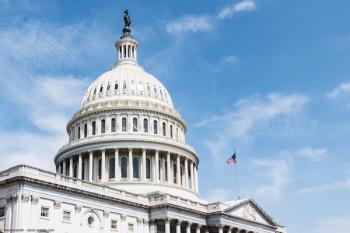
Feds, multiple states take aim at prior auth requirements
"The administrative burden associated with payer relations and benefit management contributes to rising costs and, in many cases, affects patient care," writes Ross E. Weber of the AACU.
Based on a partnership with Urology Times, articles from the American Association of Clinical Urologists (AACU) provide updates on legislative processes and issues affecting urologists. We welcome your comments and suggestions. Contact the AACU government affairs office at 847-517-1050 or
It's no surprise that prior authorization is at or near the top of every survey of physicians' concerns. AACU State Advocacy Network chair William C. Reha, MD, MBA, was recently quoted by Urology Times as saying, "As urologists we're hit in all areas with prior authorization."
The administrative burden associated with payer relations and benefit management contributes to rising costs and, in many cases, affects patient care. Indeed, in an
Compelling and practical statistics go on to detail how prior authorization affects urology offices in every practice setting. Given the incredible expense incurred addressing these administrative burdens, one might expect equal savings elsewhere in the health care system, but that isn't the case. By and large, payers approve the recommended treatment. According to an AUA survey quoted by Christopher M. Gonzalez, MD, MBA, chair of the AUA Public Policy Council, just 24% of prior authorization requests are denied by insurers and their intermediaries.
Also from the AACU:
A figure included in the Urology Times March 2019 report summarized select state proposals to minimize the burden of prior authorization. What's more, an earlier piece by the AACU posted on UrologyTimes.com explained, "The 116th Congress and state legislatures across the U.S. are making strides toward better access and affordability of drugs for patients. In just the first few weeks of the new Congress, several bills have been introduced by legislators on both sides of the aisle addressing the issues of drug pricing and transparency."
Given the importance and relevance of prior authorization, a closer look at several campaigns is justified. More than a half-dozen states are nipping at the edges, whether by requiring a single form for all payers or shortening the required response time. Several other proposals call on payers to exempt providers with a demonstrated record of approval. The Feds, meanwhile, are looking into what they can do to streamline the time-consuming and expensive process.
Federal legislation
While traditional Medicare generally does not require prior authorizations, Medicare Advantage plans are much freer to utilize the practice. Sources indicate that U.S. Reps. Suzan DelBene (D-WA) and Mike Kelly (R-PA) are drafting legislation that requires Medicare Advantage plans to file a report with regulators that details what items are subject to prior authorization, the rate of approval, and the average time for approval. Regulation of the electronic prior authorization process itself would build upon a law that was passed last October. The SUPPORT Act mandated that Medicare Part D plans accept medication prior authorization via the NCPDP SCRIPT Standard when submitted by a prescriber. Patient and physician advocates expect Reps. DelBene and Kelly to introduce their bill this summer.
Next: State lawsKentucky-New law
A comprehensive measure streamlining the prior authorization process in Kentucky sailed through the legislature this spring, with only one lawmaker voting "No" on final passage. The campaign was led by physician-legislator Sen. Ralph Alvarado, MD. A critical component of the state medical society's success was providing the layperson lawmakers "the right mix of patient stories and relevant statistics," according to an AMA summary. Physician groups are learning that explaining the economic impact of prior authorization is not sufficient. After all, payers testify with their own statistics that say prior authorization saves money.
Insurers do not have the compelling voice of patients, however. Kentucky Medical Association President Bruce Scott, MD, a Louisville otolaryngologist and facial plastic surgeon, recounted how when payers pushed for more time to respond to prior authorization requests, it was the testimony of a mother who warned that the longer response time could contribute to her daughter's seizures. "That was the end of the health plan argument," Dr. Scott said.
Read:
Under the new law, effective Jan. 1, 2020:
- Physicians will receive responses on prior authorization requests within 24 hours for urgent services and within 5 days for non-urgent services.
- Prescriptions for chronic-condition maintenance drugs will be valid for one year, and any change in dosage during this period will be covered.
- Insurers' prior authorization procedures will be posted online as well as a complete list of services requiring prior authorization.
- Insurer prior authorization reviewers will be licensed physicians and, when possible, of the same specialty as the requesting physician.
- Physicians and other clinicians will be able to electronically request and transmit prior authorizations.
Colorado-In process
Another far-reaching effort is on the cusp of being approved by the Colorado General Assembly and sent to the governor for his yea or nay. Notable provisions of HB 1211 include two exceptions: The use of prior authorization must be limited to providers whose prescribing patterns differ significantly from their peers (after adjusting for patient mix and other relevant factors); and providers with an 80% approval rate of prior authorization requests over the previous 12 months must be exempt from prior authorization requirements.
Florida-In process
HB 559 is limited in scope vis a vis prior auth in that it simply requires insurers and pharmacy benefit managers to offer an online prior authorization process. It steps out of the box a bit by also prohibiting insurers from requiring patients to repeat step therapy protocols if they must transfer from one payer to another. This bill is progressing through the legislative process.
SB 650 is a more comprehensive bill. In addition to imposing 3-day and 24-hour prior authorization response deadlines, it prohibits insurers from implementing new requirements or making changes to existing requirements unless they've been publicized and affected policyholders and providers are specifically notified. This effort has stalled since being introduced March 5.
New Mexico-New law
SB 188 was signed by the governor April 3. The new law requires the Office of Superintendent of Insurance to standardize the prior authorization process for non-emergency medical care or related benefits. Insurers must now grant or deny a request within 7 business days and within 24 hours if the provider felt that a longer delay would endanger the patient. During the legislative process, several valuable provisions had been deleted, including a requirement that the person evaluating the prior authorization request be of the same specialty as the prescriber.
Texas-In process
HB 2408 prohibits prior authorization requirements with regard to services that are benefits mandated by the state, while HB 3232 seeks to prohibit prior authorization requirements if a patient seeks care from an in-network provider. Neither of these bills are moving as quickly as HB 2327, which imposes transparency requirements including a mandate that payers publish a list of services that require preauthorization. That list must include the requirement's effective date, the list of supporting documentation, the applicable screening criteria using billing codes, and statistics regarding the insurer's preauthorization approval and denial rates.
The latest version of HB 2327 deleted a provision like Colorado's that would exempt physicians with a demonstrated record of approved prior auth requests.
Newsletter
Stay current with the latest urology news and practice-changing insights — sign up now for the essential updates every urologist needs.






